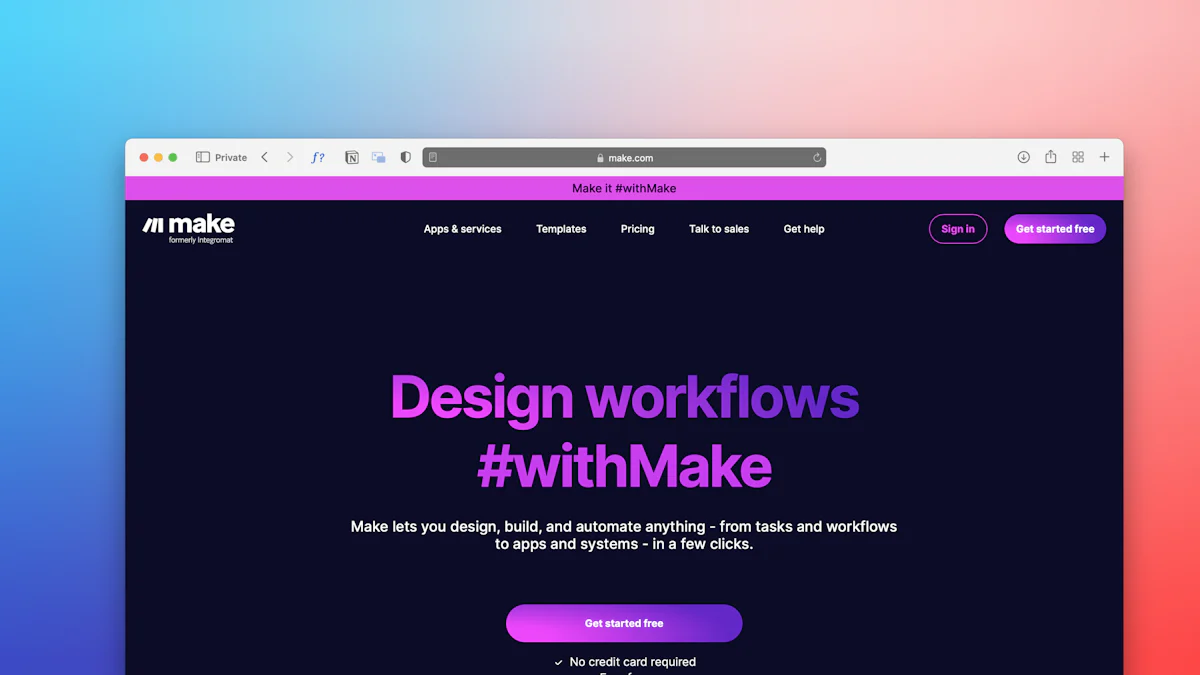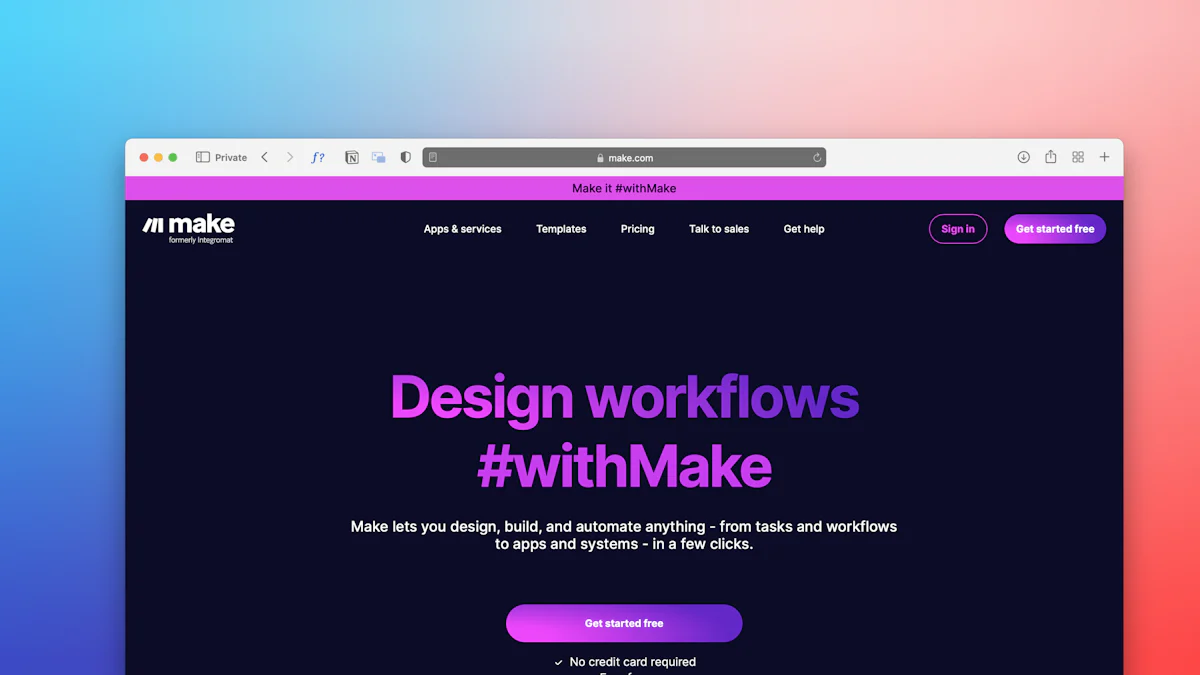Automation as a Service: A Comprehensive Overview

Automation as a Service (AaaS) provides automation solutions through on-demand, web-based services. Modern businesses rely on AaaS for seamless scaling and cost savings. Companies can save over 40,000 hours annually by automating processes. NewOaks AI exemplifies AaaS excellence. NewOaks AI offers 24/7 SMS conversation and appointment booking with omni-channel integration. Businesses enhance customer engagement and operational efficiency through NewOaks AI's advanced features, including how to do bullet points in Google Sheets, chatbot Google Sheets, and custom ChatGPT.
Understanding Automation as a Service
What is AaaS?
Automation as a Service (AaaS) provides automation solutions through on-demand, web-based services. AaaS integrates automated solutions for various use cases efficiently. Workflow automation platforms like Make and robotic process automation software like UiPath exemplify AaaS tools.
Key components of AaaS
AaaS consists of several key components:
Cloud Infrastructure: Provides the foundation for scalable and flexible automation.
Automation Tools: Includes software like UiPath and BluePrism.
Service Management: Ensures smooth operations and proactive error handling.
Security Protocols: Protects data and maintains compliance with regulations.
How AaaS differs from traditional automation
Traditional automation requires significant upfront investments and infrastructure. AaaS offers a subscription-based model, reducing initial costs. Traditional automation lacks scalability and flexibility. AaaS adapts to changing business needs seamlessly.
Benefits of AaaS
AaaS offers numerous benefits to businesses.
Cost savings
AaaS reduces operational costs significantly. For example, The Loan Store, Inc. achieved a 60% cost reduction. AMN Healthcare reduced human intervention hours from 8000 to 2600. These examples highlight substantial cost savings through automation.
Scalability
AaaS allows businesses to scale operations effortlessly. Companies can adjust automation levels based on demand. This flexibility ensures optimal resource utilization.
Flexibility
AaaS provides unparalleled flexibility. Businesses can customize automation solutions to fit specific needs. Deloitte reduced report preparation time from 5-8 days to 1 hour. This flexibility enhances efficiency and productivity.
Challenges and Considerations
Despite its benefits, AaaS presents certain challenges.
Security concerns
Data security remains a primary concern. AaaS providers implement robust security protocols. However, businesses must ensure compliance with industry standards.
Integration issues
Integrating AaaS with existing systems can pose challenges. Proper planning and execution mitigate these issues. Businesses should work closely with AaaS providers to ensure seamless integration.
Vendor lock-in
Vendor lock-in represents another challenge. Businesses must choose AaaS providers carefully. Evaluating long-term compatibility and support options helps avoid vendor lock-in.
Key Technologies Behind AaaS

Artificial Intelligence (AI)
Role of AI in automation
Artificial Intelligence (AI) drives the core functionalities of Automation as a Service (AaaS). AI algorithms analyze vast amounts of data to identify patterns and make decisions. This capability enables automation systems to perform complex tasks with high accuracy. AI enhances process efficiency by predicting outcomes and optimizing workflows.
Examples of AI-driven automation
AI-driven automation includes several practical applications. Chatbots powered by AI handle customer inquiries efficiently. AI algorithms assist in fraud detection by analyzing transaction patterns. Predictive maintenance systems use AI to forecast equipment failures, reducing downtime. These examples illustrate the transformative impact of AI on business operations.
Machine Learning (ML)
How ML enhances automation
Machine Learning (ML) significantly improves automation capabilities. ML algorithms learn from historical data to make informed decisions. This learning process allows automation systems to adapt to changing conditions. ML enhances the precision of automated tasks by continuously refining its models.
Use cases of ML in AaaS
Machine Learning finds application in various AaaS scenarios. Customer segmentation uses ML to categorize customers based on behavior. Inventory management benefits from ML by predicting stock requirements accurately. ML algorithms optimize supply chain operations by forecasting demand and adjusting logistics. These use cases demonstrate the versatility of ML in enhancing automation.
Robotic Process Automation (RPA)
Basics of RPA
Robotic Process Automation (RPA) focuses on automating repetitive tasks. RPA software robots mimic human actions to execute predefined processes. These robots interact with digital systems to perform tasks such as data entry, form filling, and report generation. RPA streamlines operations by eliminating manual intervention.
RPA applications in business
Businesses leverage RPA for various applications. Financial institutions use RPA to automate transaction processing. Human resources departments deploy RPA for employee onboarding and payroll management. Healthcare providers implement RPA to manage patient records and billing. These applications highlight the broad utility of RPA in improving operational efficiency.
Implementing AaaS in Your Business
Steps to Get Started
Assessing business needs
Businesses must first assess their specific needs before implementing Automation as a Service (AaaS). Identify key areas where automation can provide the most value. Evaluate current processes to determine inefficiencies and bottlenecks. Consider the potential for cost savings and productivity improvements. Conduct a thorough analysis to understand the scope and scale of automation required.
Choosing the right AaaS provider
Selecting the appropriate AaaS provider is crucial for successful implementation. Evaluate providers based on their expertise and track record. Consider factors such as scalability, flexibility, and security protocols. Review case studies and client testimonials to gauge provider reliability. Ensure that the provider offers comprehensive support and maintenance services. Make an informed decision to avoid vendor lock-in and ensure long-term compatibility.
Case Study: NewOaks AI
Overview of NewOaks AI
NewOaks AI stands as a leading example of effective AaaS implementation. The company specializes in automating business processes through advanced AI technologies. NewOaks AI offers a range of services, including 24/7 SMS conversation and appointment booking. The platform integrates seamlessly with various channels, enhancing customer engagement and operational efficiency.
How NewOaks AI automates business processes
NewOaks AI employs several strategies to automate business processes. The platform uses AI-driven chatbots to handle customer inquiries efficiently. These chatbots provide instant responses, reducing the need for human intervention. NewOaks AI also automates appointment scheduling, ensuring seamless coordination across different channels. The platform's advanced features include automated data entry and report generation, streamlining operations and reducing manual tasks.
Success stories and results
NewOaks AI has demonstrated significant success in various implementations. For instance, Inter Aduaneira saved 800 hours per analyst and improved response times by 80%. Credigy Solutions Inc. achieved 100% automated due diligence reviews, contributing to a 15%+ compounded annual growth rate. Aon Italy eased the workloads of 1,600 employees through automation. These examples highlight the transformative impact of NewOaks AI on business operations.
"Automation contributed to the company's growth at a 15%+ compounded annual growth rate," stated IBM in reference to Credigy Solutions Inc.
These success stories underscore the potential of AaaS to drive efficiency and growth in modern businesses.
Future Trends in AaaS
Emerging Technologies
AI advancements
Artificial Intelligence (AI) continues to evolve rapidly. New algorithms and models enhance automation capabilities. Businesses benefit from improved decision-making and predictive analytics. AI advancements drive more accurate and efficient processes. Enhanced natural language processing (NLP) improves chatbot interactions. Machine vision technologies enable better quality control in manufacturing. AI advancements promise to revolutionize various industries.
Integration with IoT
The Internet of Things (IoT) integrates seamlessly with Automation as a Service (AaaS). IoT devices collect vast amounts of data. Automation platforms analyze this data for actionable insights. Smart sensors monitor equipment performance in real-time. Predictive maintenance reduces downtime and operational costs. IoT integration enhances supply chain management through real-time tracking. Businesses achieve greater efficiency and responsiveness.
Market Growth and Predictions
Industry forecasts
Industry analysts predict significant growth for AaaS. The global market for AaaS expects to reach billions in revenue. Increased adoption across various sectors drives this growth. Small and medium-sized enterprises (SMEs) embrace AaaS for cost savings. Large corporations leverage AaaS for scalability and flexibility. The healthcare, finance, and retail sectors show substantial interest in AaaS solutions.
Potential impact on businesses
AaaS transforms business operations fundamentally. Companies experience increased productivity and reduced operational costs. Automation allows employees to focus on strategic tasks. Enhanced customer service improves satisfaction and loyalty. Businesses gain a competitive edge through faster response times. The potential impact of AaaS extends to all aspects of business operations.
Practical Applications and Tools

How to Do Bullet Points in Google Sheets
Step-by-step guide
Creating bullet points in Google Sheets enhances data presentation. Follow these steps for effective implementation:
Select the cell where the bullet point will appear.
Press
Alt+7on the numeric keypad to insert a bullet point symbol.Type the desired text next to the bullet point.
Repeat the process for additional bullet points in other cells.
This method provides a straightforward approach to adding bullet points, improving readability and organization.
Practical examples
Consider a project management sheet. Use bullet points to list tasks within a cell:
Task 1: Research
Task 2: Development
Task 3: Testing
This format makes task lists clear and concise. Another example involves inventory tracking. List items within a cell for better visualization:
Item 1: Laptops
Item 2: Monitors
Item 3: Keyboards
Chatbot Google Sheets
Integration methods
Integrating chatbots with Google Sheets streamlines data handling. Follow these methods for effective integration:
Use Google Apps Script to create a custom function that interacts with the chatbot API.
Set up triggers to automate data updates based on chatbot interactions.
Utilize third-party tools like Zapier to connect chatbots with Google Sheets seamlessly.
These methods ensure efficient data flow between chatbots and Google Sheets, enhancing operational efficiency.
Use cases
Chatbot Google Sheets integration offers numerous use cases. Customer support teams can log inquiries directly into sheets for easy tracking. Sales teams can record leads from chatbot interactions, ensuring no opportunity is missed. Educational institutions can use chatbots to collect student feedback, automatically populating Google Sheets for analysis.
Custom ChatGPT
Customization options
Custom ChatGPT offers various customization options to meet specific business needs:
Adjust response tone to match brand voice.
Incorporate industry-specific jargon for more relevant interactions.
Set predefined responses for common queries to improve efficiency.
These options allow businesses to tailor Custom ChatGPT to their unique requirements, enhancing user experience.
Implementation strategies
Effective implementation of Custom ChatGPT involves several strategies:
Identify key interaction points where automation can add value.
Train the model using relevant data to improve accuracy.
Monitor performance and make adjustments based on user feedback.
These strategies ensure that Custom ChatGPT delivers optimal results, driving efficiency and customer satisfaction.
Automation as a Service (AaaS) offers transformative benefits for modern businesses. Key points include cost savings, scalability, and flexibility. Security concerns, integration issues, and vendor lock-in require careful consideration.
AaaS enhances operational efficiency through AI, ML, and RPA technologies. Businesses like NewOaks AI demonstrate the potential of AaaS. NewOaks AI excels in SMS conversation and appointment booking.
Manthan Patel states:
"NewOaks AI stands out as a top solution for SMS conversation and appointment booking."
Explore AaaS solutions to stay ahead in today's fast-paced digital world.
See Also
Exploring Automation Solutions for AI Sales Chatbots
The Evolution of PDF Chatbots: Streamlining Processes
A Complete Overview of Shopify Bots in 2024
Enhancing Business Efficiency with AI Appointment Scheduling

